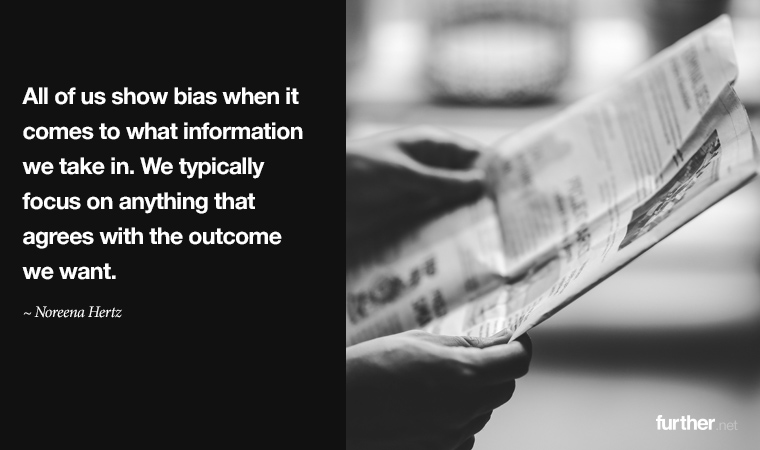
You likely know as a loyal Further reader (you are, right?) that we use what are called heuristics to take mental shortcuts when making decisions.
While these shortcuts are essential to functioning in the information-barrage we call modern life, understanding when they’re happening and deciding not to take the shortcut is one important key to thinking better.
On the other hand, some of these shortcuts — known as cognitive biases — are not only unhelpful, they can be dangerous. Cognitive biases are tendencies to think in certain ways that can lead you to routinely make decisions that violate standards of good judgment.
For example, confirmation bias is the tendency to search for or interpret information in a way that conforms with one’s existing beliefs or preconceptions. Another common problem is conformity bias, which is the tendency to behave similarly to others in a group, even if doing so goes against your own judgment.
The cure is simple, if not easy — recognize the common forms of bias and cut them off at the pass when you spot them in yourself. Problem is, the otherwise informative Wikipedia page on the topic groups 175 biases into vague categories that aren’t necessarily mutually exclusive.
A gentleman named Buster Benson who works for Slack decided to do something about it while on paternity leave. He created a cognitive bias cheat sheet that takes a different organizational approach, while also providing additional advice on how best to use it to defeat bias in ourselves.
After the guide was published, another gentleman decided to create a “diagrammatic poster remix” of the same information. You can check out both via the link below:
Keep going-
Brian Clark
Further
further: health
Sugarade
Pepsi is now selling Gatorade G Organic, which is basically regular Gatorade with a few of the chemicals, artificial colorings, and artificial sweeteners removed. But “organic” cane sugar is so highly refined that it makes no nutritional difference whether or not it is grown with pesticides, fertilizers, or herbicides — and it’s still lots of sugar.
Organic Gatorade? Still Full of Sugar
Hot Health
Capsaicin is the molecule that gives jalapenos, habaneros, cayenne, and other spicy peppers their heat. But capsaicin’s usefulness goes beyond a simple rush of perverse pleasure. Here are five other benefits to adding more heat to your diet.
Some Like it Hot: 5 Reasons to Eat More Capsaicin
Wearable Fail
Wearable activity monitors can count your steps and track your movements, but they don’t, apparently, help you lose weight. In fact, you might lose more weight without them.
Activity Trackers May Undermine Weight Loss Efforts
further: wealth
Mo’ Money, Mo’ Problems
We’ve all got roots, and those roots shape our interests, personalities, and, yep, our fears. If you associate money with problems, it’s probably because money has been a key player in the problems in your life.
A Guide to Managing Your Fear of Money
Keep Going
Forget about 62, 63, or 65. More and more Americans are embracing the new reality that is retiring at 70 — or later.
Your Job or Your Life
Should the goal of public policy be to ensure that all Americans can have good jobs — or good lives? Politicians of both parties say one thing. Policy experts of both parties say another.
Can You Have a Good Life if You Don’t Have a Good Job?
further: wisdom
Sucksess
When was the last time you did something, and put your whole heart into it, even though you knew you would suck? If the answer is “never” or “not in a very, very long time,” now is the time to try it again.
Here’s Why You Absolutely Must Do Things You’re Really Bad At
Anxiety is Aight
“Humans are particularly well-situated to be able to anticipate the future and plan for the future,” founder and director emeritus of the Center for Anxiety and Related Disorders at Boston University and author David Barlow explains, and that’s where anxiety is actually quite functional.
Psychologists Say Anxiety Is the ‘Shadow’ of Intelligence
Mindful Listening
It’s not necessary or desirable to silence the mind. To realize our full potential, we must listen to the mind as it helps us make meaning of our experience.
Stop Quieting the Mind and Start Questioning It: The Practice of Inquiry
further: sharing
Please forward this issue of Further to a friend who could benefit from it. Or use these easy social options:
